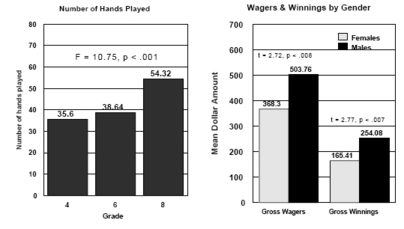The WAGER, Vol. 1(27) – Developmental differences in children’s gambling behavior
The skill of mathematical reasoning involved in certain gambling tasks requires individuals to be at a specific developmental level. The relatively sophisticated level of cognitive strategy necessary for understanding probability is generally acquired between the ages of 11 and 15. A recent study of 104 children ranging in age from 9 to 14 examined developmental differences in children’s gambling behavior. Children played a computerized blackjack game which measured risk-taking behavior. The computer eliminated the possibility of mathematical mistakes by adding the cards for each hand. Students were given a bankroll of $100 in “play money” to use in the ten minute time limit allotted for the simulation exercise. In addition, the possibility of winning movie certificates was an incentive to completing the task with a total greater than $100. This study found that males made significantly higher gross wagers and had significantly greater gross winnings than females, suggesting that males exhibited greater risk-taking behaviors than females. In addition, the mean number of hands played increased significantly with age. The authors suggest that older children were more able than younger children to process information quickly, use sophisticated cognitive strategies, and understand the laws of probability. Alternative explanations for these findings exist; for example, money and the chance to win movie certificates may hold different meaning for children depending upon their age. Further research will be necessary to explore developmental differences in children’s gambling behavior.
Source: Derevensky, J.L., Gupta, R., & Cioppa, G.D. (1996). A developmental perspective of gambling behavior in children and adolescents. Journal of Gambling Studies, 12, 49-66.
This public education project is funded, in part, by The Andrews Foundation and the Massachusetts Department of Public Health.
This fax may be copied without permission. Please cite The WAGER as the source.
For more information contact the Massachusetts Council on Compulsive Gambling,
190 High Street, Suite 6, Boston, MA 02110.
